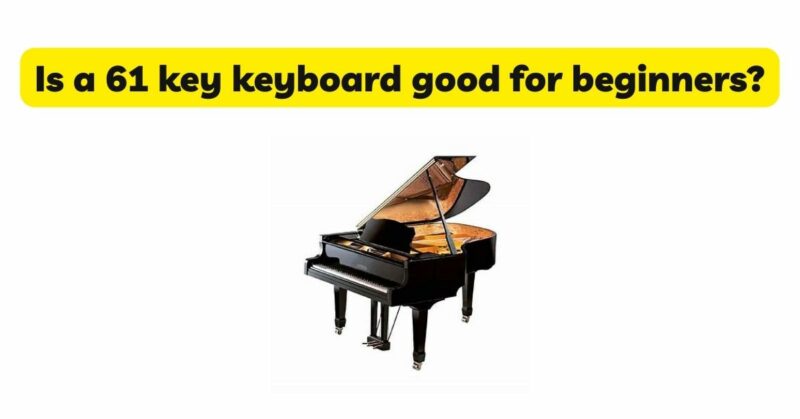When starting your musical journey, choosing the right keyboard is crucial. One option often considered by beginners is a 61-key keyboard. These compact and affordable instruments offer a balance between functionality and simplicity. This article aims to explore the pros and cons of a 61-key keyboard for beginners, helping you make an informed decision about whether it is the right choice for you.
Pros of a 61-Key Keyboard for Beginners:
- Affordability: One of the primary advantages of a 61-key keyboard is its affordability. Beginners who are hesitant to make a significant financial commitment can find entry-level keyboards in this range that fit their budget. It allows you to embark on your musical journey without a substantial upfront investment, giving you the opportunity to explore your interest in playing the keyboard before considering a more advanced instrument.
- Portability: 61-key keyboards are typically lightweight and compact, making them highly portable. They are easy to carry and store, allowing you to practice and play the keyboard wherever you go. This portability is particularly advantageous for students, musicians on the move, or those with limited space at home. It provides flexibility and convenience, enabling you to practice and perform in various settings.
- Simplicity and Ease of Use: A 61-key keyboard offers a simplified layout that is less overwhelming for beginners. With fewer keys to navigate, it becomes easier to understand and grasp basic concepts such as scales, chords, and melodies. The reduced number of keys also allows for simpler hand positioning and fingering, making it more manageable for beginners to develop their technique and coordination.
- Versatility in Popular Music Genres: If your musical interests lie in popular music genres such as pop, rock, or electronic music, a 61-key keyboard can be well-suited to your needs. These genres often rely on repetitive chord progressions and simpler melodies, which can be adequately played within the range of a 61-key instrument. Moreover, these keyboards often include features such as built-in rhythms, accompaniment styles, and sound effects that cater to popular music production.
- Focus on Musical Creativity: A limited number of keys can encourage beginners to focus on musical creativity and composition. With a 61-key keyboard, you are forced to work within a restricted range, which can stimulate creative thinking and exploration of different musical possibilities. This limitation can also help you develop a more intentional approach to arrangement and utilize the available keys effectively.
Cons of a 61-Key Keyboard for Beginners:
- Limited Range and Repertoire: One of the significant drawbacks of a 61-key keyboard is its limited range compared to larger keyboards or pianos. It may not provide the full span of octaves required for certain classical compositions, advanced repertoire, or more intricate musical pieces. If you have a specific interest in classical, jazz, or piano-based music, you may find a 61-key instrument somewhat restrictive.
- Transition to Larger Keyboards: If you plan to transition to a larger keyboard or an acoustic piano in the future, starting with a 61-key instrument may require some adjustment. Moving to a larger keyboard will require learning new fingerings, adapting to the expanded range, and potentially relearning pieces that utilize keys beyond the 61-key limit. However, with consistent practice and determination, this transition can be managed effectively.
- Limited Touch Sensitivity: Many entry-level 61-key keyboards lack touch sensitivity, meaning that the keys do not respond to the force with which they are played. This absence of touch sensitivity can hinder the development of dynamics and expression in your playing. While some higher-end 61-key keyboards offer touch-sensitive keys, it is essential to carefully consider this feature when selecting a specific instrument within this category.
- Adaptability to Different Genres: While a 61-key keyboard can accommodate popular music genres, it may not be as versatile for certain styles such as classical or jazz. These genres often require a wider range of octaves and intricate chord progressions that extend beyond the 61-key limit. If your musical interests are diverse and encompass various genres, you may find a larger keyboard or piano more suitable for your needs.
Conclusion:
Deciding whether a 61-key keyboard is suitable for beginners involves considering the instrument’s pros and cons in relation to your musical interests, goals, and budget. While a 61-key keyboard offers affordability, portability, and simplicity, it may have limitations in terms of range, repertoire, touch sensitivity, and adaptability to different genres. If your interests primarily lie in popular music genres and you are looking for an entry-level instrument to start your musical journey, a 61-key keyboard can be a viable option. However, if you have aspirations of exploring more advanced repertoire or diverse musical genres, you may want to consider a larger keyboard or piano. Ultimately, the choice should align with your musical preferences, goals, and long-term aspirations as a keyboardist.


